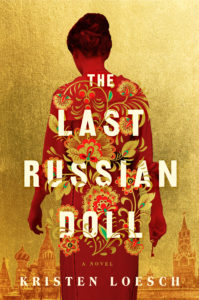 The Last Russian Doll is an epic, set both during the 1917 Russian Revolution, and the more recent revolution – the one that abolished the Soviet Union in 1991. The more present day heroine, Rosie, or Raisa, her actual name, is a British grad student who fled from Russia with her mother to the UK after the murders of her father and sister. Her mother is now an ancient drunk who rarely gets out of her bed; as the book opens, she dies, but Rosie is headed back to Russia as an assistant to a famous writer (he brings to mind Alexander Solzhenitsyn). She will be there to help with research, but what she really wants is to solve the mystery of her father’s and sister’s deaths.
The Last Russian Doll is an epic, set both during the 1917 Russian Revolution, and the more recent revolution – the one that abolished the Soviet Union in 1991. The more present day heroine, Rosie, or Raisa, her actual name, is a British grad student who fled from Russia with her mother to the UK after the murders of her father and sister. Her mother is now an ancient drunk who rarely gets out of her bed; as the book opens, she dies, but Rosie is headed back to Russia as an assistant to a famous writer (he brings to mind Alexander Solzhenitsyn). She will be there to help with research, but what she really wants is to solve the mystery of her father’s and sister’s deaths.
In the past, we meet beautiful Tonya, the young, pampered wife of an industrialist. She is bored with her life – she feels like a captive and one day she encounters a man, a Bolshevist, making an incendiary speech. The man works for her husband and the two are magnetically drawn to one another. While the author refers to Tolstoy in her afterword, this book had far more of a Dr. Zhivago feel, Pasternak’s story of revolution and forbidden love finding an echo here.
Loesch beautifully illustrates the revolution itself as it happens, with the upper classes refusing to believe it will happen, and the revolutionaries amazed that it has happened. The violence and uncertainty of those times is conveyed in an indelible way, and your heart is in your throat every time Tonya steps out of her safe and protected home. Few escaped disaster and heartbreak at that time, and Tonya and her beloved – as well as Tonya’s husband – are no exception.
Rosie’s clue to her past is found inside the head of a Russian doll that her mother kept close by her throughout her life. The tiny penciled words inside the doll’s head help her begin to make sense of her family roots and her connection to Tonya. Of course, there’s a connection, but the mystery of the novel is just what the connection might be. She’s followed on her journeys through Moscow and to other parts of Russia by a bodyguard, Lev. Her boss knows her family history and is attempting to protect her. Lev, silent and watchful, with ties to the secret police, is her enigmatic and ultimately helpful guide. He can actually read the script from the doll’s head, for example.
The author ties the book together with short fairy tales that relate back to the action in the novel, though they are opaque and you have to do some work, as a reader, to decipher them. This book broke my heart several times, but the most powerful sequence is set during the siege of Leningrad by the Germans that lasted from 1941 to 1944. The residents of Moscow who didn’t get out were stuck in a city with no heat and no food, many of them so starving they resorted to cannibalism. The heartbreak endured by Tonya and her family is almost too much to bear, and yet, millions of Russians suffered during the war as Tonya and her family did.
The two story threads and the relationship between the two women draws closer and closer as the book draws to an end. I loved these two women, though Tonya is the better drawn of the two, Rosie is an interesting character living through an interesting and historic moment in Russia’s history – just as Tonya did. The cliched curse, of course, is may you live in interesting times. These are interesting times to read about, but I’m sure they were painful to live through. The one weak spot in this novel was the actual reason for the deaths of Rosie’s family members, but I could overlook it as the rest of the story was so compelling and hard to look away from. This is a wonderful read.